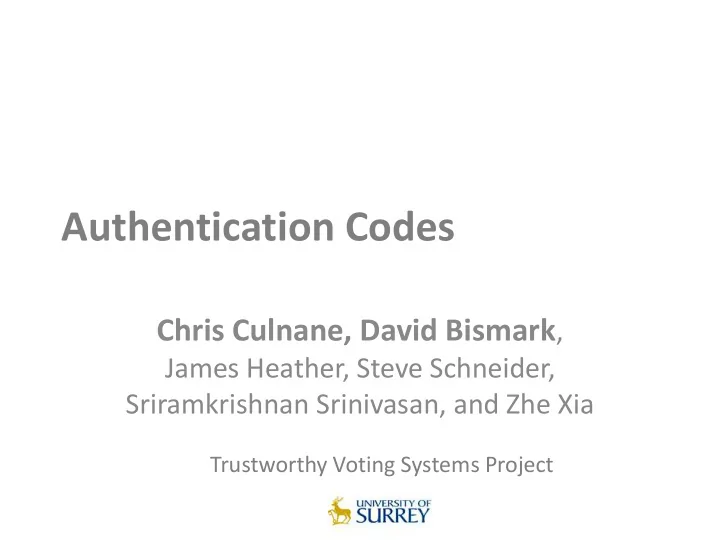

Authentication Codes Chris Culnane, David Bismark , James Heather, Steve Schneider, Sriramkrishnan Srinivasan, and Zhe Xia Trustworthy Voting Systems Project
Overview • Introduction to Prêt à Voter • Importance of Digital Signatures • Human Verifiable Codes • Authentication Codes • Short Code Variant • Future Work
Introduction to Prêt à Voter 1 3 2
Human Verifiable Codes • Acknowledgement Codes in PGD • Matrix of codes • New simpler approach proposed
Authentication Codes • Universal front-end for both ranked and plurality elections • Simple to use • Provides assurance that vote has been recorded as cast • Verification, and any challenge, is performed in the polling station
Assumptions • Peered Web Bulletin Board • Trusted Election Manager • Chain of custody
Overview
Election Manager • Notation – n = number of candidates – m = preference range (n in ranked elections, 1 in plurality elections) – φ denotes blank spaces • Take values between 0 and m , along with one φ • Randomly permute and concatenate, n times • The following example uses n =4
Election Manager • Extract locations of φ [3,7,17,19] • Replace φ with zero • Create Authentication Values – Zero value with a 1 in the location of φ
Election Manager • Locations of φ [3,7,17,19]
Election Manager • The Authentication Values and Authentication Code are encrypted using the shared public key • These encrypted values are sent to each peer
Voter Perspective
WBB Perspective • Receives voting preferences [3,1,2,0] • Each peer, independently, constructs Authentication Code from encrypted values and decrypts • Partial decryptions from peers are combined and plaintext returned to voter
Scaling [3,1,2,0]
Addition
Decryption • Each peer performs partial decryption and provides proof of decryption • Each peer should have reconstructed exactly the same value to perform the decryption on • Valid partial decryptions are combined and plaintext Authentication Code is returned to the voter
Summary • Easy user interface • Intuitive how preference is blinded • Code length grows quadratically with n
Short Code Variant • Reduce to linear growth • Shorten initial code • Additional level of indirection • Code Length is given by: • Where n is the number of candidates and p is 1/ p probability of guessing location • ½ probability -> p =2, if n =4 • 4+(2-1)(4+1) = 9
Short Code – Voter Perspective
Short Code Election Manager • Notation – n = number of candidates – m = preference range ( n in ranked elections, 1 in plurality elections) – φ denotes blank spaces • Take values between 0 and m , along with n φ • Randomly permute • The following example uses n =4
Short Code Election Manager • Extract locations of φ [1,4,7,9] • Replace φ with zero • Create Authentication Values – Zero value with a 1 in the location of φ
Short Code Election Manager • Locations of φ [1,4,7,9]
Short Code Election Manager • The Authentication Values and Authentication Code are encrypted using the shared public key • Each value is associated with a set of n labels in canonical order
Short Code Election Manager • Create indirection by randomly permuting labels • The permuted list of letters is printed on the Authentication Strip
Short Code Election Manager • Re-order Authentication Values according to canonical order of labels • These values are sent to the WBB peers
WBB Perspective • Identical to full length scheme
Summary • Same level of security by using an additional level of indirection • More work for the voter – Once a voter has destroyed their left hand side they can be assisted in filling in the Authentication Strip without breaking secrecy
Further Discussion • Since the unverified digital signature does not provide the properties we desire, can we remove it and in doing so remove the need to check the WBB? • There is an additional chain of custody burden for the Authentication Strip – There is already a chain of custody for the ballot form (in terms of privacy)
Future Work • Out of band construction of Authentication Strip – Removes chain of custody problem – Possibly increases coercion? • How to audit Authentication Strips • How can Authentication Strips be used during the Prêt à Voter ballot form audit
QUESTIONS?
Recommend
More recommend